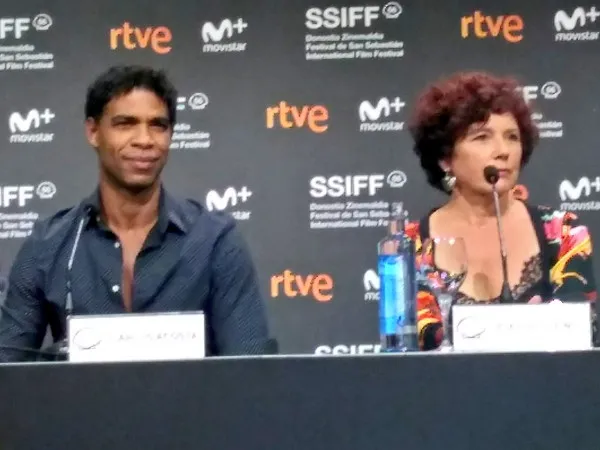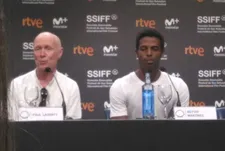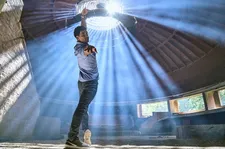 |
| Carlos Acosta and Icíar Bollaín. Acosta: 'It was the most enriching experience of my life but traumatic' Photo: Amber Wilkinson |
Speaking at the press conference in San Sebastian, the 45-year-old, who also plays himself in one part of the film, said: "It was the most enriching experience of my life but traumatic. I had written a book to free me from my past and I was reliving it again. Iciar and Paul were cheering me on - it's a film with a lot of integrity."
The film shows Acosta as a reluctant and rebellious student, but he makes no bones about what it takes to ultimately succeed.
 |
| Paul Laverty and Keyvin Martínez, who plays a younger version of Acosta in the film Photo: Amber Wilkinson |
In addition to telling the story of Acosta's roots, the film is stitched into the social fabric of Cuba, with archive footage showing people trying to flee the economic crisis during the 'special period', at a time when he, ironically, was desperate to return home.
"With Cuba," he says, "everyone knows it's gone through any transformations from the 1980s. I remember in the 1980s when there existed all the citizens street parties when all the citizens cleaned and there was a committee to make sure what suburb was the most beautiful and they made sure the lawn was cut and the kids played sack races and singing competitions. And that's the environment that I was brought up in.
 |
| Iciar Bollain's Yuli Photo: Courtesy of San Sebastian Film Festival |
And as for his advice for youngsters with dancing aspirations, he says: "I see this film as a testimony to ' Yes you can'."
He adds: "If you get involved in this world, it's a lot of work to be able to be able to fly and to jump with your muscles and to turn into the sun so that you shine so much that you cannot be ignored. The most difficult thing is, despite the pain, to maintain that spirit alive."
We also spoke to Laverty and Bollain about the film and will bring you the interviews soon. The film screens at Glasgow Film Festival this week.





















